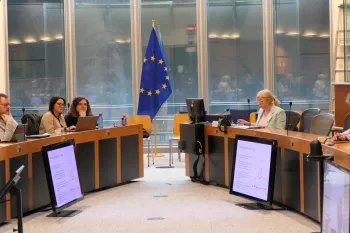BRUSSELS—Last week, participants in the “Chicken Welfare Roundtable: Collaboration for Change” at the European Parliament called for urgent reforms to improve the lives of chickens raised solely for meat—often referred to as “broiler” chickens—in the European Union.
The roundtable brought together policymakers, industry representatives, scientists, and animal welfare advocates to discuss the urgent need for improved animal welfare standards in chicken production. It was hosted by Maria Noichl, Member of the European Parliament from the Group of the Progressive Alliance of Socialists and Democrats, along with Humane World for Animals Europe (formerly called Humane Society International/Europe), World Animal Protection, the Albert Schweitzer Foundation, and Essere Animali.
The event opened with a presentation by Nicky Amos, managing director of Chronos Sustainability, who shared key insights from The Pecking Order report and the Business Benchmark on Farm Animal Welfare (BBFAW)—global benchmarks that evaluate how food companies manage and report on farm animal welfare. Amos explained that while company scores on these assessments have shown improvement, most still fall short of public expectations for animal welfare and that legislation is key in ensuring accountability and establishing consistent animal welfare standards throughout the industry.
A moderated panel discussion followed which featured Amos along with Christoph Schulz, a German chicken farmer; Dr. Anja Riber, senior researcher for the Department of Animal and Veterinary Sciences at Aarhus University; and Dr. Ester Alaez Pons, animal welfare policy officer at the Directorate-General for Health and Food Safety at the European Commission.
Panelists emphasized that with more than 6 billion chickens slaughtered annually in the EU for meat, collaboration among policymakers, scientists, the chicken industry, and animal advocates is crucial for building a healthier, more resilient Europe with higher animal welfare standards.
“Farmers want to do better for animal welfare, but the current system makes it difficult,” said Schulz. “Financial support and subsidies must be more accessible to help us transition, as the process is too complex. A level playing field is essential, we cannot compete with low-welfare imports while trying to improve standards.”
Noichl stated: “Over 6.4 billion broiler chickens are slaughtered in the EU every year. Most of them live in conditions that do not align with the expectations of European citizens when it comes to animal-friendly farming. Current intensive farming practices result in severe health issues for the birds, ranging from locomotion disorders to heart and respiratory diseases. We need political action now. I urge the European Commission to swiftly deliver a proposal to revise the Broiler Directive to ensure modern, science-based, and enforceable animal welfare standards.”
Dr. Joanna Swabe, senior director of public affairs at Humane World for Animals Europe added, “While corporate actors can certainly help to shift the needle to improve the welfare of animals in the chicken meat industry by taking steps to, for example, introduce slower growing breeds and reducing stocking densities, it is crucial that the European Commission acts to deliver on its existing commitment to revise the EU's animal welfare legislation, including the Directive protecting chickens kept for meat production, to bring it in line with current scientific understanding of animal welfare.”
The event highlighted the growing momentum for policy changes to improve farmed chicken welfare. Attendees urged the European Commission and national governments to prioritise animal welfare in upcoming legislative reforms.
For an overview of the current state of the chicken industry, the minimum welfare standards outlined in the European Chicken Commitment, and our legislative requests, see this document. You can also examine the evaluation of the chicken welfare policies and progress of major fast-food brands in Poland and Romania in the 2024 Pecking Order report.
